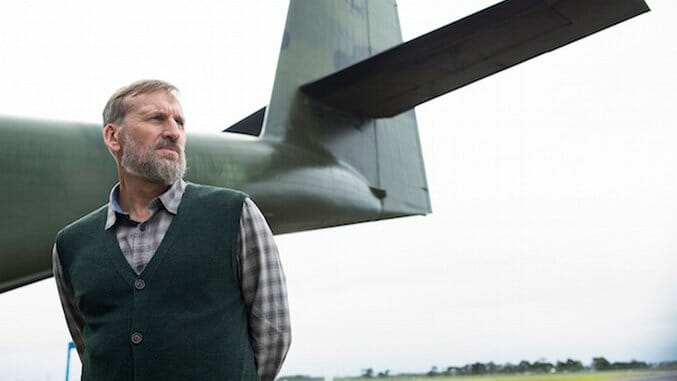The Leftovers: Daniel in the Lions’ Den
(Episode 3.05)
Ben King/HBO
Is thy God, whom thou servest continually, able to deliver thee from the lions? —Daniel 6:20
The drop of blood on the Bible’s page is the sort of premonition one finds in scripture, though by now we know that Matt (Christopher Eccleston) sees signs of God only when it suits him. He scrambles to wipe the spot from the passage in the Book of Daniel, with its tale of a true believer delivered from the lions’ den, and in his haste to hide his illness, he misses the moment’s portent: In “It’s a Matt, Matt, Matt, Matt World,” the reverend is the supplicant sealed in with his fate, and no higher power deigns to save him.
As has been the case since “Two Boats and a Helicopter,” The Leftovers’ first in a long line of astonishing entries, Matt limns the world for spiritual messages as if born of another age; his faith is closer to the millennialism of this season’s opening sequence than it is to the Episcopal tradition in which he was trained. See his conviction that Miracle is “special,” or the smirk that comes to his face after the jolt of the plane, when Laurie (Amy Brenneman) dismisses the notion that Kevin is “the goddamn Second Coming of Christ”: Matt identifies God’s purpose in occurrences great and small, find plans in probabilities, meaning in mere chance. (Of course, he doesn’t see it this way: “You have the better story,” Laurie admits at one point, strategizing Kevin’s retrieval. “My story,” he replies matter-of-factly, “is true.”) En route to Melbourne with Laurie, Michael (Jovan Adepo) and John (Kevin Carroll), Matt spends much of the episode’s first half defending his belief against competing interpretations; as John points out, for instance, Miracle’s ostensible place in God’s design could not prevent the death of his daughter or the dissolution of his marriage. It’s Laurie’s challenge that turns out to be most formidable, though, in part because Brenneman offers it with such biting sarcasm:
Three years ago, my ex-husband experienced severe delusions and tried to kill himself. And instead of acknowledging his mental illness, you turned it into fucking Scripture. And when he found out about it, he relapsed and ran halfway around the world, probably to get the fuck away from you. Is that what’s happening here? Am I grasping it, Matt?
The episode sets up a situation in which, to paraphrase my description of Kevin and Nora in “G’Day Melbourne,” faith and science are modes of understanding between which there is no translation, and The Leftovers is careful not to leave Laurie with the upper hand. Across from that smirk, her face bears concern; when she attempts to account for John’s calm by saying, “He found peace,” Matt rightly retorts, “He think his daughter’s still alive. That’s not peace.”
As is the series’ wont, “It’s a Matt, Matt, Matt, Matt World” poses such profound questions in the midst of pure chaos: Diverted to Tasmania after the detonation of a nuclear weapon in the South Pacific, the characters join a group of the “debased and sinful” on an 11-hour sex cruise to the mainland, replete with an actual lion. (They’re granted passage after Matt tells the filthiest joke he knows: “What’s the difference between a pimple and a priest? A pimple waits until you’re 12 to come on your face.”) Once on board, Matt finally meets “God”—a murderous former Olympian and broadcaster—face to face, and when his desire for justice crashes into the pride’s resistance to judgment, all hell breaks loose. I must admit that The Leftovers lost me here, for the first time this season; the series is emphatic, bold, but rarely so blunt, and its reimagining of Daniel in the lions’ den, with the man of God almost pumped for his “seed” by a “pride” of debauched predators, read to me as lingering residue of Season One’s more unappealing excesses.